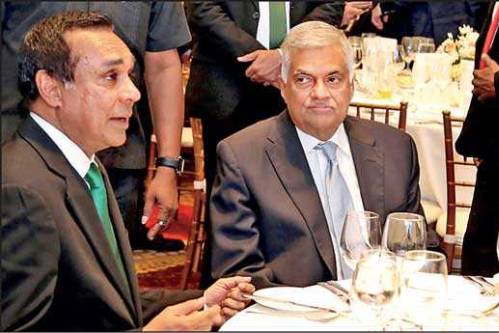Emirates President Tim Clark on Wednesday shared his checklist for the next renaissance of tourism in Sri Lanka with some frank views, useful suggestions, and constructive criticism, citing global examples and lessons.
In his keynote at The Hotels Association of Sri Lanka (THASL) Annual General Meeting, at which Prime Minister Ranil Wickremesinghe was the Chief Guest, Clark said smoothening the visa process, developing the right tourism products, supporting local operators, and incentivising investments for tourism are key.
However, the Emirates Chief emphasised: “But without marketing, no one is going to know the wonderful things happening in Sri Lanka. It is important to get the word out there on the global stage, to travellers who have a dazzling array of other competing destinations to choose from.”
It was pointed out that Sri Lanka has so much to offer, but: “Sri Lanka has to believe in its product and the potential, and work together to make things happen. The country must collectively galvanise for the next tourism renaissance for this amazing country.”
In terms of stepping up global marketing and PR, Clark said Sri Lanka must recapture the interest and imagination of travellers and grow its reputation as a tourism powerhouse. “With all what Sri Lanka has as a destination, there is plenty of marketing material. What it needs is a good story that stands out. Think big and get the word out. Forget old-fashioned trade shows, and look at how the Sri Lankan story is told digitally. When building a brand, whether for destination or product, put all possible resources and effort behind it, and sustain it,” Clark added.
Recalling that it was six months since the tragic Easter Sunday terror attacks in Sri Lanka, Clark said the horrendous event, and the violence and tragic loss of lives, was a shock to Sri Lanka and the world, and noted the tourism recovery has been slow.
Listing several other global terror attacks in major tourist destinations, Clark said all have bounced back. He said the Easter Sunday attacks are a terrible one-off setback in the history of Sri Lanka, but the country has what it takes to not only recover, but to shine bright again in the global tourism stage. “My message is pull together, galvanise resources, and forge ahead,” he urged.
“Tourism is a key economic pillar for Sri Lanka and the health of the industry is high on everyone’s agenda. How serious is Sri Lanka in the global competition for tourism dollars? What is the appetite for big thinking and bold moves?” Clark asked a packed THASL AGM, attended by industry leaders. In a forthright speech, he shared how Dubai became a global tourist destination, and cited several other international success stories.
“Out of nothing, Dubai has become a global tourist destination, but this was possible with bold vision, strong belief in the destination, and plenty of sheer grit to mobilise everything it has at its disposal. What Dubai didn’t have, it created, with public and private sector working hand-in-hand towards shared goals. Dubai’s transformation wasn’t an accident, but very much planned and driven by the country’s leaders, not afraid to think big or bold,” Clark pointed out.
Referring to the visa system, he said he paid a small fee for a business tourist visa, and his wife didn’t, as she was on a leisure visit. “So the two of us had two different visa requirements and different processing routes. Why not do away with the whole rigmarole,” he quipped. Whilst commending the reintroduction of the expanded visa-fee-free scheme as a positive and welcome step in the right direction, Clark however noted it wasn’t a ground-breaking move, or a stand-out initiative in the global tourism market.
“What if Sri Lanka could abandon reciprocity principles, and throw open her doors, so it becomes the most welcoming nation on the planet? Do away with any forms for those visa-fee-free countries, and use innovative ways to manage the security requirement, such as the use of biometrics at airport,” he suggested.
Posing a question whether there could be any bold thinking when it comes to a process as legalistic, bureaucratic and entrenched in tourism as visa requirements, Clark highlighted Malaysia’s Second Home scheme, which has taken multi-entry and long-stay visa to the next level.
Commending the post-war tourism product and development, Clark suggested Sri Lanka needs to keep building, as there was plenty of room and opportunity for further development. “In the short term, do what it takes to stimulate and support tourism recovery, but keep an eye on the game plan for 5 to 10 years,” he said, adding the country must use all options, such as incentives, tax holidays, PPPs, etc., to attract FDIs and tourism development.
Betting on Asia to drive tourism, Clark said Sri Lanka must also develop tourism products to cater to Millennials and Gen Z travellers who are environmentally and socially conscious, active silver travellers, and female travellers. He added that cruise tourism was another avenue, as it is one of the fastest growing sectors, and being a shipping hub, Sri Lanka can benefit from this wave.
(FT)

